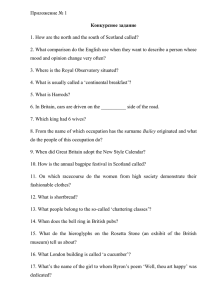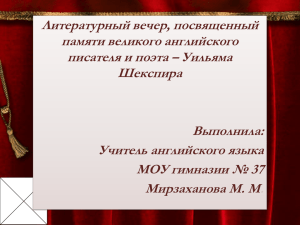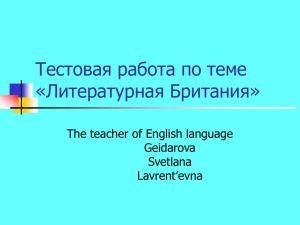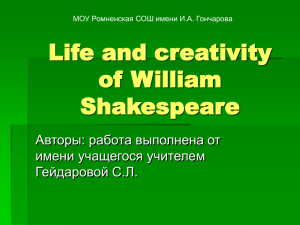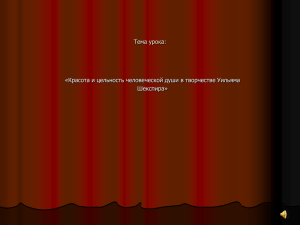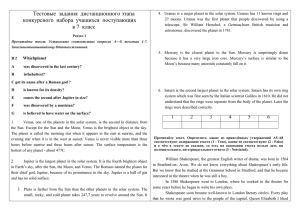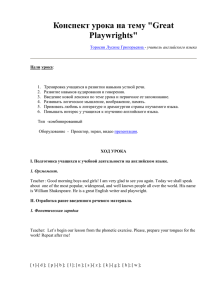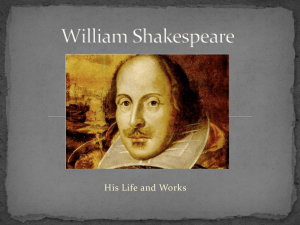Вечер английской литературы в старших классах "William
реклама
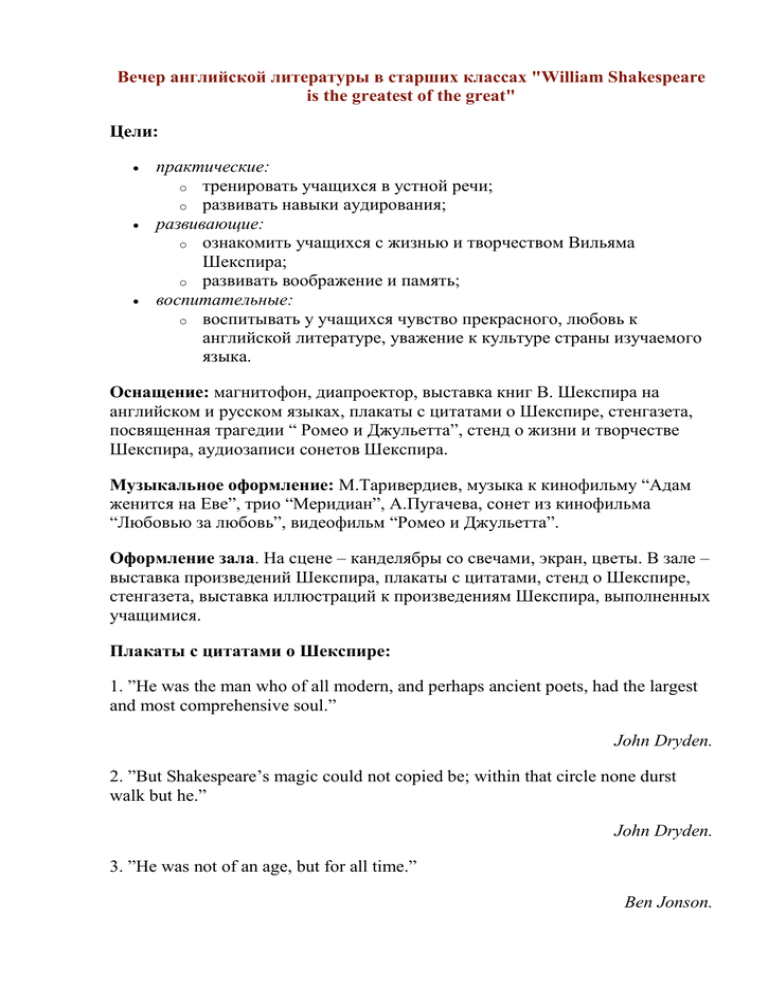
Вечер английской литературы в старших классах "William Shakespeare is the greatest of the great" Цели: практические: o тренировать учащихся в устной речи; o развивать навыки аудирования; развивающие: o ознакомить учащихся с жизнью и творчеством Вильяма Шекспира; o развивать воображение и память; воспитательные: o воспитывать у учащихся чувство прекрасного, любовь к английской литературе, уважение к культуре страны изучаемого языка. Оснащение: магнитофон, диапроектор, выставка книг В. Шекспира на английском и русском языках, плакаты с цитатами о Шекспире, стенгазета, посвященная трагедии “ Ромео и Джульетта”, стенд о жизни и творчестве Шекспира, аудиозаписи сонетов Шекспира. Музыкальное оформление: М.Таривердиев, музыка к кинофильму “Адам женится на Еве”, трио “Меридиан”, А.Пугачева, сонет из кинофильма “Любовью за любовь”, видеофильм “Ромео и Джульетта”. Оформление зала. На сцене – канделябры со свечами, экран, цветы. В зале – выставка произведений Шекспира, плакаты с цитатами, стенд о Шекспире, стенгазета, выставка иллюстраций к произведениям Шекспира, выполненных учащимися. Плакаты с цитатами о Шекспире: 1. ”He was the man who of all modern, and perhaps ancient poets, had the largest and most comprehensive soul.” John Dryden. 2. ”But Shakespeare’s magic could not copied be; within that circle none durst walk but he.” John Dryden. 3. ”He was not of an age, but for all time.” Ben Jonson. 4. ”The stream of time, which is continually washing the dissoluble fabrics of other poets, passes without injury by the adamant of Shakespeare.” Samuel Johnson. 5. ”We know what we are, but we know not; what we may be.” W. Shakespeare. ХОД МЕРОПРИЯТИЯ В зале гаснет свет. Звучит музыка М. Таривердиева к кинофильму “Адам женится на Еве”, увертюра. Двое учащихся зажигают свечи. На экране – портрет Шекспира. 1-й чтец: Whoever has her wish, you have your “will”, And “will” to boot, and “will” in overplus; More than enough am I that vex you still To your sweet will making addition thus. The sea, all water, yet receives rain still And in abudance addeth to his store; So you, being rich in “will” add to your “Will” One will of mine, to make your large “Will” more. Let no unkind, no fair beseechers kill Think all about one, and me in that one “Will”. Недаром имя, данное мне, значит “Желание”. Желанием томим, Молю тебя: возьми меня в придачу Ко всем другим желаниям твоим. Ужели ты, чья воля так безбрежна, Не можешь для моей найти приют? И если есть желаньям отклик нежный Ужель мои ответа не найдут? Как в полноводном, вольном океане Приют находят странники – дожди, – Среди своих бесчисленных желаний И моему пристанище найди. Недобрым “нет” не причиняй мне боли. Желанья все в твоей сольются воле. 1-й ведущий: Hello, dear friends! 2-й ведущий: We are happy to welcome you at our party devoted to the English literature. 1-й ведущий: It is impossible to speak about the English literature without speaking about this author. 2-й ведущий: He was the man who had the largest and most comprehensive soul. People all over the world can’t help admiring his great talent. 1-й ведущий: William Shakespeare… The brilliant poet, the marvelous dramatist, the greatest of the great. He was not of an age, but for all time. (На экране – дом, где родился Шекспир) 2-й чтец: William Shakespeare was born in 1564 , in the town of Stratford-onAvon. His father, John Shakespeare, was a prominent citizen who became an alderman. In his childhood William probably attended the Stratford Grammar school. (На экране – школа, где предположительно учился Шекспир) 3-й чтец: In 1582 he married Anne Hathaway. A daughter was born to thi in 1583, and twins, a boy and a girl, in 1585. After the birth of the twins we know absolutely nothing about Shakespeare’s life for the next seven years. (На экране – театр времён Шекспира) 4-й чтец: By the year 1592 Shakespeare had arrived in London and became dramatist. He began to write plays to the theatre “The Globe”. He was also an actor, but not a first – rate one. During the last years of his life Shakespeare wrote less and less. In 1613 after the Globe had been destroyed by the fire, he came back to Stratford and stopped writing altogether. In April 1616 he died and buried in the same church, where he was christened. (На экране – портрет Шекспира) 5-й чтец: He was a great poet, but not the only one; a great dramatist, but not the only one; he was a learned man but not the only one. And still he is the greatest of the great, because he was “for all time”; because he was very much of his own age. (Звучит аудиозапись сонета “Увы, мой стих не блещет новизной” в исполнении М. Таривердиева. На фоне вступления учащийся читает этот сонет на английском языке) 6-й чтец: Shakespeare’s literary work may be divided into 4 periods. The most popular of the first period is “Richard III”. During the second period Shakespeare wrote historical plays and comedies such as “Henry V”, “Julious Caesar”, “The two Gentlien of Verona”, “A Midsummer Night’s Dream”, “As you like it “, “Twelfth Night” and others. 7-й чтец: All his comedies are written in easy – flowing verse. The text is full of jokes and puns. All the comedies tell of love and harmony. One of the most popular comedies is “Merry Wives of Windsor”. (На экране кадры из комедии на фоне аудиозаписи “Сонета о потерянной любви” в исполнении трио “Меридиан”) 8-й чтец: During the third period Shakespeare wrote the great tragedies that were the peak of his achievient and made him truly immortal. He brought something new to the tragedy. All his tragic characters are shown in their development. Hamlet, Otheloo, King Lear at the end of the tragedy are not the people they were at the beginning. The tragedy “Hamlet” is the most popular one. 9-й чтец: Читает монолог Гамлета “Быть или не быть? Вот в чём вопрос”. (На экране кадры диафильма о трагедии) 2-й чтец: We can’t speak about Shakespeare without speaking about his sonnets. They are his only lyrical pieces, the only things he has written about himself. By reading between the lines of the sonnets we may see a tragedy in Shakespeare’s life, a tragedy which he might not have fully understand himself. (На экране – портрет Шекспира. Звучит аудиозапись сонета 40 в исполнении А. Пугачёвой из кинофильма “Любовью за любовь”. На фоне вступления учащийся читает сонет на английском языке) 3-й чтец: Shakespeare wrote 154 sonnets. They are very beautiful and very lyrical even in Russian. Let’s listen to some of them and you will see it yourselves. Учащиеся читают сонеты Шекспира на русском языке по своему выбору. Затем учитель музыки Зиновьева О. Г. Исполняет сонет 90 на музыку С. Никитина под гитару. На экране кадры из кинофильма “Ромео и Джульетта”. 4-й чтец: The popularity of Shakespeare all over the world grows from year to year. New productions of Shakespeare, new traditions of Shakespeare, critical works on Shakespeare appear again and again. 5-й чтец: “Romeo and Juliet” is one of the most popular and frequently produced plays. It is a true masterpiece. (Демонстрируются сцены из кинофильма: “На балу в доме Монтекки”, “В саду Капулетти” и др.) 6-й чтец: They lived in Verona. They loved in Verona. They died in Verona. 7-й чтец: Сонет 116 (на русском языке) “Мешать соединению двух сердец…” (На фоне увертюры к кинофильму “Адам женится на Еве”) (На экране – портрет Шекспира) 8-й чтец: He was a great poet, but not the only one; a great dramatist, but not the only one; he was a learned man, but not the only one. And still he is the greatest of the great. He was “for all time”. 1-й чтец: Whoever has her wish, you have your “will”… и т.д. (В зале затихает музыка, гаснут свечи)
